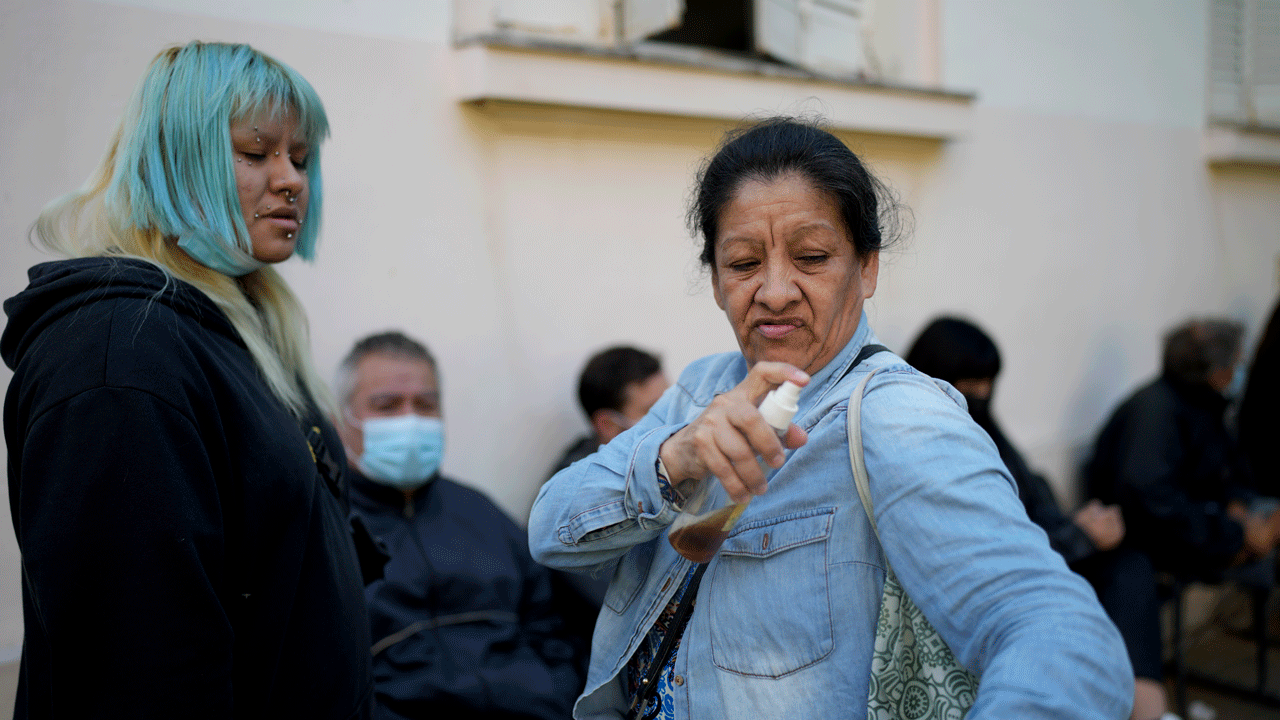Fox News Flash top headlines for April 9
Fox News Flash top headlines are here. Check out what's clicking on Foxnews.com.
BUENOS AIRES, Argentina (AP) — Shelves have gone empty, as residents hunt in vain and resort to DIY alternatives. And surging resale prices are shocking even to Argentines accustomed to triple-digit inflation. The country’s latest crisis: There isn’t enough mosquito repellent.
As the South American country contends with its worst outbreak of dengue fever in recent memory, bug spray has become this season’s hot-ticket item. So hot that it's sold out in virtually all Buenos Aires stores and going for exorbitant prices online, in some cases as much as 10 times the retail value.
ARGENTINA’S POVERTY LEVEL RISES TO 57.4%, MARKING 20-YEAR HIGH
"We’ve been to at least 30 pharmacies all over the city and there is nothing left," Ana Infante said as she swatted mosquitoes away from her two small daughters, their arms visibly pocked with red bumps. Infante, 42, joined the frenzied race for repellent when her co-worker at an empanada shop fell seriously ill with dengue last week.

A woman sprays herself with a makeshift mosquito repellent of vanilla and water as she waits to be attended at a hospital amid a surge in dengue fever cases, in Buenos Aires, Argentina, Friday, April 5, 2024. A nationwide increase in dengue fever cases has resulted in the demand for repellents to prevent the bite of the mosquito that transmits the disease, causing a shortage and exorbitant prices where available. (AP Photo/Natacha Pisarenko)
"All we have is this," she said, raising her swatting hand.
Rampant hoarding and surging prices have stoked desperation. In one widely shared video from a market in the town of El Talar outside the capital Thursday, shoppers are seen descending on an employee opening new boxes of bug spray, snatching up stock before he could place a single bottle on a shelf.
"I feel helpless, because I know I can’t do anything," said Marta Velarde, a 65-year-old shop owner in Buenos Aires, recalling how a distraught customer recently threatened to punch her in the face when she broke the news she had no repellent left. "You have no explanation and people are very aggressive."
As public outrage mounted and the repellent shortage evolved from nuisance to national news, the government — busy battling sky-high inflation and near-daily protests — was forced to intervene. On Thursday, authorities lifted import restrictions on foreign-made mosquito repellents to boost supply and announced they would ramp up production at local labs.
"We spoke with producers who told us that they have changed their capacity to produce, they are doing it at their maximum capacity," Health Minister Mario Russo told the local Telefé channel Thursday in his first TV appearance since the dengue outbreak. When asked how Argentines should protect themselves in the meantime, he offered a warning that was instantly mocked on social media:
"Be careful with shorts," he said.
The dengue virus has exploded across Latin America over the past muggy weeks of summer in the Southern Hemisphere.
The mosquito-borne illness has long been endemic in countries like Brazil and Colombia, but experts warn the worsening outbreak in Argentina means the Aedes aegypti mosquito has widened its range. Dengue infections in Argentina have soared to over 180,500 this season, according to health authorities, including 129 deaths. That’s six times higher than last season’s count, which was already the worst on record.
Health experts attribute the dengue surge to multiple factors, including the El Niño ocean warming effect and climate change. Recent drenching rains that flooded Buenos Aires have created ideal breeding conditions for mosquitoes.
"Transmission never stopped in the previous season, because less cold winters are favorable for adult mosquitoes," said Susana Lloveras, a specialist at the Francisco Javier Muñiz Infectious Diseases Hospital in Buenos Aires. "The magnitude is really worrisome, because there is a lot of demand on our health system."
The dengue problem has been exacerbated by the nationwide run on repellant. Political opponents of Libertarian President Javier Milei’s have used the repellent crisis to criticize the government’s push to deregulate the economy and scrap price controls.
Pharmacists across Buenos Aires — fed up with fielding calls about repellent supply — have put signs on their doors telling customers not to bother.
In an online Buenos Aires forum on Reddit that normally is preoccupied with soccer match tickets, many users now focus on where to procure scarce repellant. "I am willing to pay dearly," read one seeker's post Thursday from northwest Argentina.
Since February, wholesalers have hiked prices and some Argentines have stockpiled repellent to resell when stories run out. Now most lotions and sprays online fetch between $20 and $40 — five or 10 times the original market price.
"It's just outrageous," said 53-year-old Adrián Contrares, a seller of Gaucho-themed knickknacks at his neighborhood park in northern Buenos Aires. "That's a day's wage. Who can afford that? Who would spend that?"
Contrares and other Argentines are resorting to homespun methods to keep bugs away. He sets egg cartons alight and tosses citronella incense sticks into tiny crackling fires. Smoke, claimed 60-year-old baker Pablo Vulgo, is nature’s best repellent. An 8-year-old eavesdropper on a bike quickly chimed in, explaining his mom’s technique of mixing coffee grounds with garlic cloves to fend off the flying insects.
CLICK HERE TO GET THE FOX NEWS APP
Buenos Aires' municipal health minister, Fernán Quirós, hosted a dengue prevention workshop last week in a crowded shantytown where sanitation is poor and mosquitoes abound. Instagram videos show him instructing residents how to make repellent at home with heaps of herbs and boiled essential oil, both well beyond their purchasing power.
And the final step? "Cover and let it rest for 40 days."









































